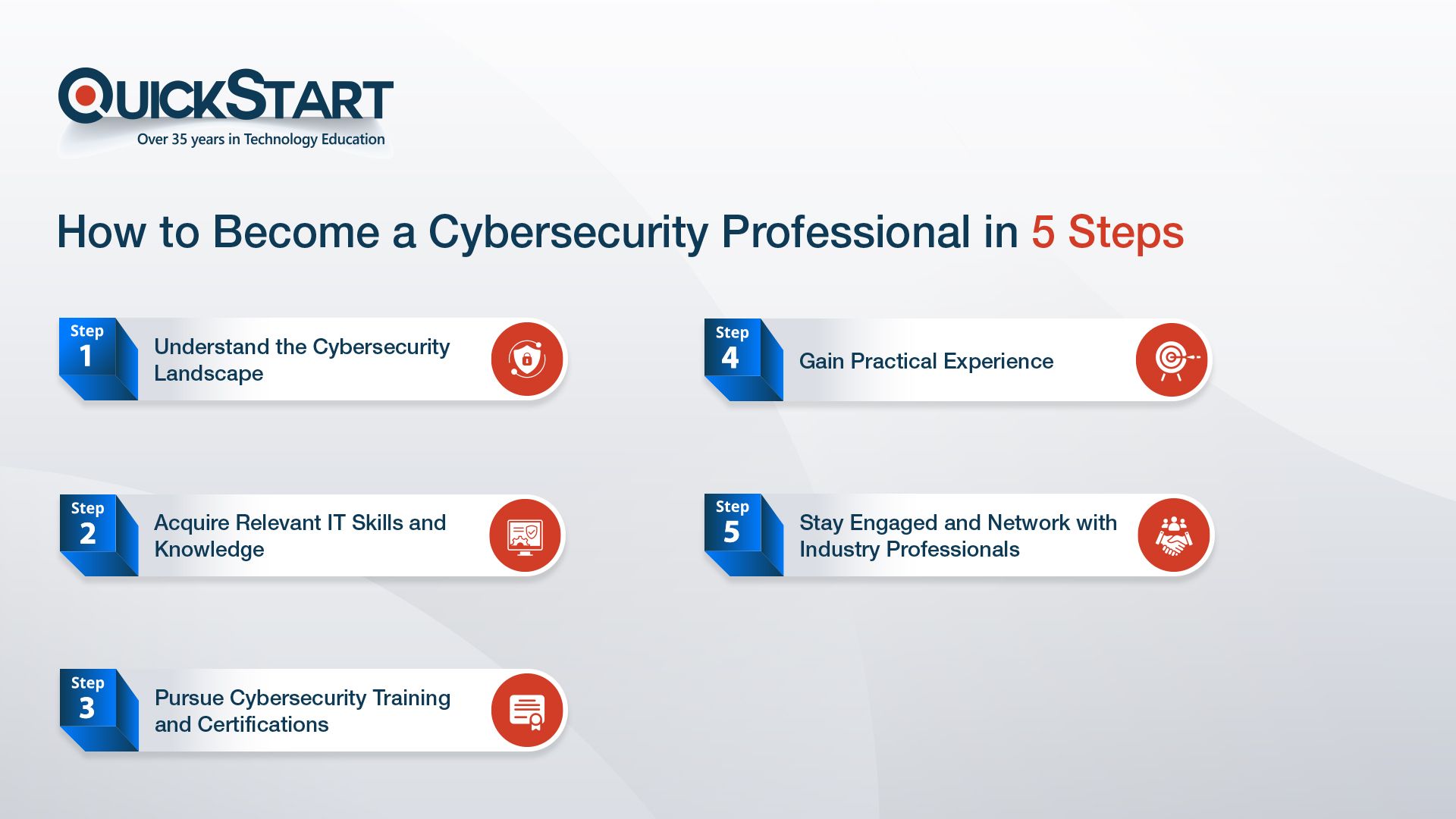
How to Become a Cybersecurity Professional in 5 Steps
Are you fascinated by the ever-evolving digital landscape, intrigued by the complexities of data protection, and eager to defend against cyber threats? If so, a career in cybersecurity could be your calling.
In this guide, we'll take you through the essential steps to embark on a successful journey towards becoming a cybersecurity professional.
To provide a comprehensive understanding of this path, we'll also introduce you to QuickStart’s cybersecurity bootcamp and certificate courses. These offerings are designed to equip aspiring cybersecurity professionals with hands-on experience and a curriculum that encompasses the core skills required in the field.
How do I become a cybersecurity professional?
Become a cyber professional by acquiring the necessary IT skills, pursuing the right certifications, and networking with the right industry professionals.

Step 1: Understand the Cybersecurity Landscape
85% of American adults use the internet every day (Gitnux). This creates a reliance on technology, creating a parallel need for educated, informed cybersecurity professionals.
Imagine being a vigilant security guard responsible for protecting a building from unauthorized access and potential threats. In the digital realm, cybersecurity professionals play a similar role, safeguarding data and systems from cyberattacks.
This field spans a diverse array of aspects, ranging from data protection and network security to cloud security and incident response (CompTIA). To illustrate these intricate positions, envision the roles within cybersecurity as specialized positions in a digital defense force:
-
Security Analysts operate as vigilant sentinels, monitoring network activities and repelling potential threats.
-
Network Security Engineers stand as architects of digital fortresses, ensuring the structural integrity of network infrastructures.
-
Ethical Hackers function as cyber detectives, proactively simulating attacks to identify vulnerabilities before malicious hackers exploit them.
To succeed in this dynamic environment, staying up to date with the latest trends and emerging threats is vital.
Step 2: Acquire Relevant IT Skills and Knowledge
Imagine building a sturdy foundation for a complex structure; your proficiency in IT serves as the cornerstone for your journey in cybersecurity.
Mastering programming languages, such as Python and Java, is akin to learning new languages to enhance communication. Understanding operating systems—like Windows, Linux, and macOS—is comparable to comprehending the intricate functions of a vehicle's various systems.
Think of computer hardware, software, and virtualization technologies as the essential components of a bustling city. Just as a city requires buildings, roads, and virtual spaces to thrive, your IT skills are the infrastructure that supports your expertise in cybersecurity.
Step 3: Pursue Cybersecurity Training and Certifications
While a robust IT foundation is essential, formal training and certifications provide tangible validation of your expertise to potential employers.
Consider enrolling in reputable IT training companies such as QuickStart, which offers tailored cybersecurity courses designed for aspiring professionals. Certifications like CompTIA Security+ and Certified Ethical Hacker (CEH) not only enhance your job prospects but also demonstrate your commitment to the field (Global Knowledge).
QuickStart’s Cybersecurity Bootcamp encompasses an array of certifications, including CompTIA Security+, CompTIA CYSA+, CompTIA Network+, and CompTIA Pentest+. These certifications collectively prepare you for various facets of cybersecurity, ensuring you possess the comprehensive skills demanded by the industry.
Step 4: Gain Practical Experience
While education and certifications lay the foundation, practical experience is the cornerstone of expertise in the cybersecurity domain. Just as a pilot refines their skills through flight hours, a cybersecurity professional sharpens their abilities by addressing real-world security challenges. Internships, volunteer work, or entry-level positions within IT departments offer invaluable exposure to cybersecurity practices.
Many of the best cybersecurity bootcamps also offer hands-on experience before you graduate. These programs help you develop valuable skills, sometimes as soon as day one of your curriculum.
Additionally, consider establishing a home lab—a virtual testing ground—where you can experiment with diverse cybersecurity tools and techniques. This hands-on approach allows you to deepen your understanding of the field, empowering you to tackle intricate cybersecurity issues with confidence.
Step 5: Stay Engaged and Network with Industry Professionals
Networking is the lifeline of the cybersecurity community. However, only 48% of working professionals keep up with their network (TeamStage), even though networking is one of the main ways to open doors to your next opportunity.
Therefore, attending cybersecurity conferences, workshops, and webinars allows you to interact with like-minded individuals and gain exposure to cutting-edge trends and technologies.
Furthermore, participating in online cybersecurity communities and forums facilitates knowledge-sharing and collaborative problem-solving. They also help you engage with a rapidly-growing number of new cybersecurity professionals entering the industry.
Following cybersecurity influencers and thought leaders on social media platforms ensures you're well-informed about the latest industry developments, keeping you at the forefront of cybersecurity advancements.
Pursue the Cyber Career You Deserve
Embarking on the path to becoming a cybersecurity professional is a journey of continuous learning, commitment, and adaptability.
By comprehending the IT landscape, acquiring in-demand cybersecurity skills, pursuing training and certifications, gaining hands-on experience, and actively engaging within the industry, you're setting yourself up for success in this vital field.
Remember that cybersecurity is not merely a career—it's a mission to safeguard the digital realm. With resources like QuickStart’s cybersecurity bootcamp and certificate courses, you can confidently navigate the challenges and opportunities this journey offers.
By dedicating yourself to honing your skills and staying ahead of cyber threats, you're contributing to a safer digital world for individuals and organizations alike.
